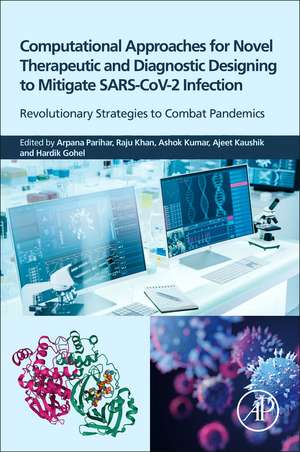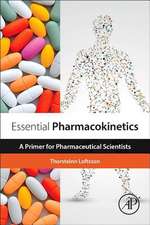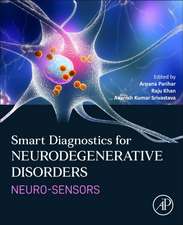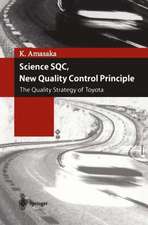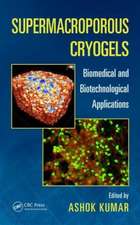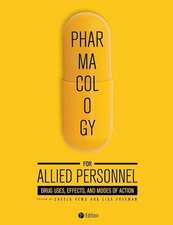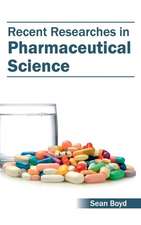Computational Approaches for Novel Therapeutic and Diagnostic Designing to Mitigate SARS-CoV2 Infection: Revolutionary Strategies to Combat Pandemics
Editat de Arpana Parihar, Raju Khan, Ashok Kumar, Ajeet Kumar Kaushik, Hardik Gohelen Limba Engleză Paperback – 14 iul 2022
This book is an essential resource for researchers, bioinformaticians, computational biologists, computational chemists and pharmaceutical companies who are working on the development of effective and specific therapeutic interventions and point-of-care diagnostic devices using various computational approaches.
- Covers computational based approaches for designing and repurposing drugs
- Discusses immunoinformatic and reverse vaccinomic approaches for effective vaccine design
- Categorizes information about artificial intelligence-based drug screening and diagnostic tools
Preț: 716.81 lei
Preț vechi: 887.93 lei
-19% Nou
Puncte Express: 1075
Preț estimativ în valută:
137.20€ • 149.09$ • 115.33£
137.20€ • 149.09$ • 115.33£
Carte tipărită la comandă
Livrare economică 14-28 aprilie
Preluare comenzi: 021 569.72.76
Specificații
ISBN-13: 9780323911726
ISBN-10: 0323911722
Pagini: 618
Dimensiuni: 191 x 235 x 42 mm
Greutate: 1.33 kg
Editura: ELSEVIER SCIENCE
ISBN-10: 0323911722
Pagini: 618
Dimensiuni: 191 x 235 x 42 mm
Greutate: 1.33 kg
Editura: ELSEVIER SCIENCE
Cuprins
1. Overview of coronavirus pandemic
2. Epidemiology and pathogenesis of novel coronavirus (SARS-COV-2)
3. The Global impact of pandemic on world economy and public health response
4. Genomic, proteomic and metabolomic profiling of SARS-CoV2
5. Current Challenges in development of therapeutic and diagnostic application for SARS-CoV2 detection
6. Available drugs for treatment of SARS-CoV2 and their side effects
7. Genomic and proteomic targets for development of drugs to combat pandemic
8. The classical approaches for drug design and development
9. Natural products as a therapy to combat against SARS-COV2 virus infection
10. Support of computational methods to design and develop therapies
11. Computational methods for optimizing drugs and delivery methods to manage COVID-19 pandemic
12. Pharmacophore mapping and modelling approaches for drug development
13. Quantitative structure activity relationship based computational approaches
14. Molecular docking and molecular dynamic simulation approaches for drug development and repurposing
15. Computational approaches for drug repositioning and repurposing to combat SARS-CoV2 infection
16. Network biology and system biology based computational approaches for drug repositioning
17. Databases, drug bank and virtual screening platforms for therapeutic development
18. Absorption, Distribution, Metabolism, Excretion and Toxicity (ADMET) assessment of drugs using computational tools
19. Immuno-informatics and reverse vaccinomic approaches for effective vaccine design
20. Artificial Intelligence based drug screening and repurposing tools and their application in present scenario
21. Machine learning and deep learning-based AI tools for development of diagnostic tools
22. Role and development of artificial intelligence-based smartphone apps for point-of-care coronavirus infection diagnostics
23. Present therapeutic and diagnostic approaches for SARS-CoV-2 infection
24. Clinically available/ under trial drugs and vaccines for treatment of SARS-CoV-2
25. Present and Future challenges in therapeutic designing using computational approaches
26. AI enabled IoT in covid-19 detection and monitoring entire digital healthcare
27. Remote monitoring and management in vitro diagnostic (IVD) devices as fixed assets
28. Predict potential downtime of any IVD solutions deployed in a customer’s clinical setting
29. Recommendation systems for the best IVD solution for a customer’s needs
30. Digital healthcare data visualization and analytics for better decision-making
2. Epidemiology and pathogenesis of novel coronavirus (SARS-COV-2)
3. The Global impact of pandemic on world economy and public health response
4. Genomic, proteomic and metabolomic profiling of SARS-CoV2
5. Current Challenges in development of therapeutic and diagnostic application for SARS-CoV2 detection
6. Available drugs for treatment of SARS-CoV2 and their side effects
7. Genomic and proteomic targets for development of drugs to combat pandemic
8. The classical approaches for drug design and development
9. Natural products as a therapy to combat against SARS-COV2 virus infection
10. Support of computational methods to design and develop therapies
11. Computational methods for optimizing drugs and delivery methods to manage COVID-19 pandemic
12. Pharmacophore mapping and modelling approaches for drug development
13. Quantitative structure activity relationship based computational approaches
14. Molecular docking and molecular dynamic simulation approaches for drug development and repurposing
15. Computational approaches for drug repositioning and repurposing to combat SARS-CoV2 infection
16. Network biology and system biology based computational approaches for drug repositioning
17. Databases, drug bank and virtual screening platforms for therapeutic development
18. Absorption, Distribution, Metabolism, Excretion and Toxicity (ADMET) assessment of drugs using computational tools
19. Immuno-informatics and reverse vaccinomic approaches for effective vaccine design
20. Artificial Intelligence based drug screening and repurposing tools and their application in present scenario
21. Machine learning and deep learning-based AI tools for development of diagnostic tools
22. Role and development of artificial intelligence-based smartphone apps for point-of-care coronavirus infection diagnostics
23. Present therapeutic and diagnostic approaches for SARS-CoV-2 infection
24. Clinically available/ under trial drugs and vaccines for treatment of SARS-CoV-2
25. Present and Future challenges in therapeutic designing using computational approaches
26. AI enabled IoT in covid-19 detection and monitoring entire digital healthcare
27. Remote monitoring and management in vitro diagnostic (IVD) devices as fixed assets
28. Predict potential downtime of any IVD solutions deployed in a customer’s clinical setting
29. Recommendation systems for the best IVD solution for a customer’s needs
30. Digital healthcare data visualization and analytics for better decision-making
